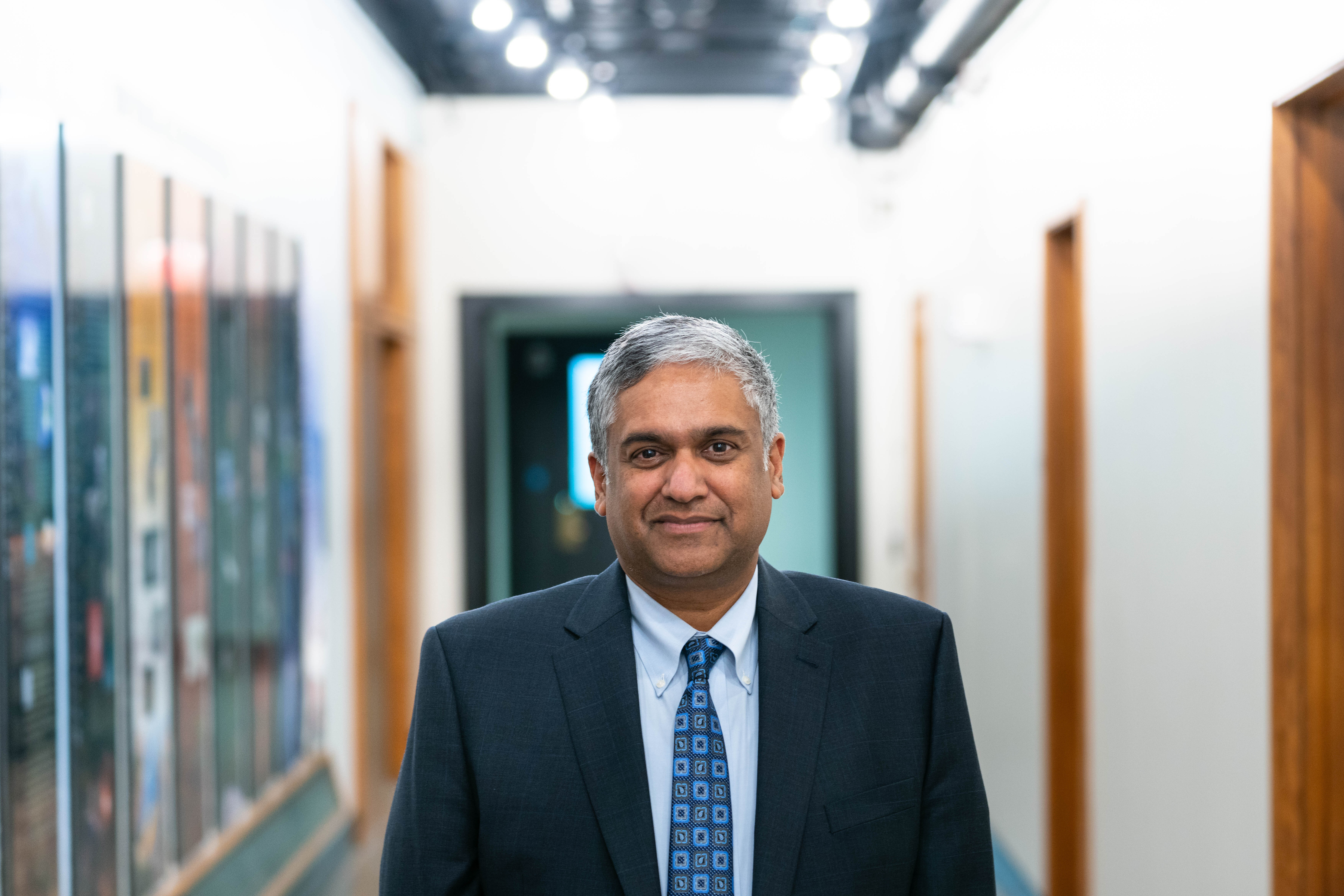
Anantha Chandrakasan, dean of the School of Engineering and the Vannevar Bush Professor of Electrical Engineering and Computer Science, has been named as MIT’s first chief innovation and strategy officer, effective immediately. He will continue to serve as dean of engineering, a role he has held since 2017.
As chief innovation and strategy officer, Chandrakasan will work closely with MIT President Sally Kornbluth to advance the ambitious agenda that she has laid out in the first year of her presidency. He will collaborate with key stakeholders across MIT, as well as external partners, to launch initiatives and new collaborations in support of these strategic priorities.
“I was immediately impressed by Anantha’s can-do attitude and his clear interest in working with us to develop and advance our priorities for the Institute,” President Kornbluth says. “With his signature energy, creativity, and enthusiasm, he has a gift for organizing complex initiatives and ideas and making sure they move forward with alacrity. Combined with his strategic insight, deep knowledge across many subject areas, and terrific record in raising funds for important ideas, Anantha is uniquely suited to serve MIT in this new role, and I’m delighted he has agreed to take it on.”
In his new role, Chandrakasan will help develop and implement plans to advance research, education, and innovation in areas that President Kornbluth has identified as her top priorities — such as climate change and sustainability, artificial intelligence, and the life sciences. He will also play a leading role in efforts to secure the resources needed for MIT researchers to pursue bold work in these key areas.
“I am thrilled and honored to help advance President Kornbluth’s vision for MIT in this new role,” Chandrakasan says. “Working closely with faculty, staff, and students across the Institute, I am excited to help shape and launch initiatives that will accelerate research and innovation on some of the world’s most urgent needs. My hope is to enable our researchers with the support, resources, and infrastructure they need to maximize the impact of their work.”
Working closely with MIT’s existing programs in entrepreneurship, Chandrakasan will develop strategies to accelerate innovation across the Institute. These efforts will aim to grow and support these programs, while identifying new opportunities to support student and faculty entrepreneurs and maximize their impact.
In addition to examining ways to advance research, entrepreneurship, and collaborations, Chandrakasan will work with Provost Cynthia Barnhart and Chancellor Melissa Nobles to advance new educational initiatives. This will include developing new programs and tracks to optimize students’ preparation for a variety of career paths.
“In many ways, this role is a natural extension of the significant work Anantha has already been doing to help shape strategic priorities on an Institute level,” Barnhart says. “All of MIT stands to benefit from his extensive experience launching and building new programs and initiatives.”
As dean of engineering since 2017, Chandrakasan has implemented a variety of interdisciplinary programs, creating new models for how academia and industry can work together to accelerate the pace of research. This has resulted in the launch of initiatives including the MIT Climate and Sustainability Consortium, the MIT-IBM Watson AI Lab, the MIT-Takeda Program, the MIT and Accenture Convergence Initiative, the MIT Mobility Initiative, the MIT Quest for Intelligence, the MIT AI Hardware Program, the MIT-Northpond Program, the MIT Faculty Founder Initiative, and the MIT-Novo Nordisk Artificial Intelligence Postdoctoral Fellows Program.
Chandrakasan has also played a role as dean in establishing a variety of initiatives beyond the School of Engineering. He was instrumental in the 2018 founding of the Schwarzman College of Computing, the most significant structural change to MIT in nearly 70 years. He also has served in leadership roles on MIT Fast Forward, an Institute-wide plan for addressing climate change; as the inaugural chair of the Abdul Latif Jameel Clinic for Machine Learning in Health; and as the co-chair of the academic workstream for MIT’s Task Force 2021. Before becoming dean, Chandrakasan led an Institute-wide working group to guide the development of policies and procedures related to MIT’s 2016 launch of The Engine, and also served on The Engine’s inaugural board.
Chandrakasan has focused as dean on fostering a sense of community within MIT’s largest school. He has launched several programs to give students and staff a more active role in shaping the initiatives and operations of the school, including the Staff Advice & Implementation Committee, the undergraduate Student Advisory Group, the Graduate Student Advisory Group (GradSage), the Gender Equity Committee, and the MIT School of Engineering Postdoctoral Fellowship Program for Engineering Excellence. Working closely with GradSage, Chandrakasan has also played a role in establishing the Daniel J. Riccio Graduate Engineering Leadership Program.
Prior to becoming dean in 2017, Chandrakasan served for six years as head of the Department of Electrical Engineering and Computer Science (EECS), MIT’s largest academic department. As department head, he led the development of initiatives that continue to have an impact across MIT. He created Rising Stars in EECS, an academic career workshop that rotates amongst various universities and has become a model for similar efforts in other disciplines. Under his leadership, EECS also launched the SuperUROP program as well as Start6, which has since become StartMIT, a program supporting students interested in entrepreneurship.
